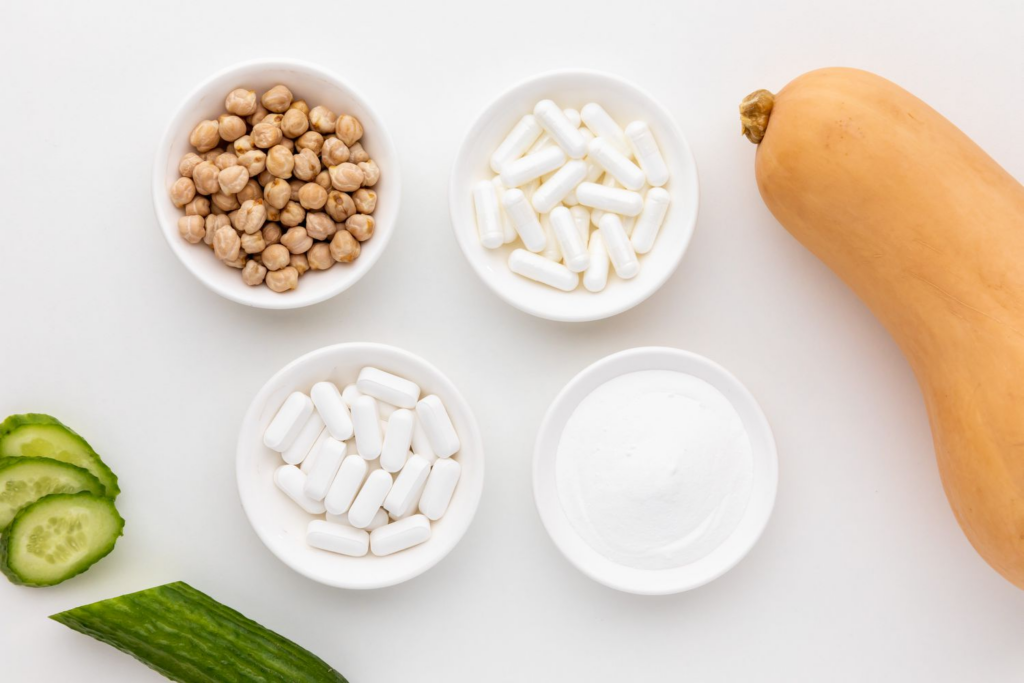Citrulline, pronounced as “sih-troo-leen,” is a fascinating amino acid that has garnered attention for its potential health benefits.
In this article, we will delve into the world of citrulline, exploring its definition, historical roots, various types, benefits of supplementation, sources, dosage guidelines, potential side effects, and important precautions.
By the end, you’ll have a thorough understanding of citrulline and its potential to enhance various aspects of well-being.
Introduction to Citrulline:
Citrulline, a non-essential amino acid, holds a key place in the body’s biochemistry. Classified as non-essential, it means that the body can produce citrulline on its own.

The name is derived from the Latin word “citrullus,” which translates to watermelon. This amino acid plays a vital role in the urea cycle, aiding in the removal of ammonia from the body.
Definition and Pronunciation:
Pronounced as “sih-troo-leen,” citrulline may sound complex, but its significance in bodily functions is anything but.
It was first isolated from watermelon in 1930, setting the stage for discoveries about its potential health benefits.
Historical Origin from Watermelon:
The historical roots of citrulline trace back to watermelon, where it was initially discovered. The Latin connection with “citrullus” underscores the close relationship between this amino acid and the juicy, refreshing fruit. Watermelon remains a prominent natural source of citrulline to this day.
Types of Citrulline:
Citrulline exists in various forms, each with its unique properties and applications.
Citrulline: Naturally Found in Foods:
The most common form of citrulline, L-Citrulline, is naturally found in foods. It is a product of the urea cycle, showcasing its inherent role in the body’s processes.
Citrulline Malate: A Boost for Exercise:
Citrulline Malate is a specialized combination of L-Citrulline and malic acid. Particularly known for its potential to enhance exercise performance, it has become a go-to supplement for athletes and fitness enthusiasts seeking a natural performance boost.
Citrulline DL-Citrulline: Synthetic Form:
Citrulline DL-Citrulline is a synthetic form of citrulline. While not as commonly used for dietary or medicinal purposes, it adds a layer of versatility to the understanding of citrulline.
Read: 617-865-6557: Direct Line to Expert Assistance In 2024
Benefits of Citrulline Supplementation:
Citrulline supplementation has gained prominence due to its potential health benefits.
Improved Exercise Performance:
Research suggests that citrulline can increase endurance, reduce muscle fatigue, and overall enhance workout performance.
Athletes and fitness enthusiasts have turned to citrulline as a natural and safe performance-enhancing supplement.
Enhanced Recovery:
In addition to performance improvement, citrulline may aid in post-exercise recovery. Studies indicate that it helps reduce muscle soreness and speeds up the recovery process.
Cardiovascular Health:
Citrulline has been linked to improvements in cardiovascular health, primarily by helping lower blood pressure. Through vasodilation, it widens blood vessels, promoting better blood flow and supporting heart health.
Erectile Dysfunction:
Some studies explore citrulline as a potential natural remedy for erectile dysfunction. By relaxing blood vessels, it may improve blood flow to the genital area. However, consulting a healthcare professional is crucial before using citrulline for this purpose.
Immune System Support:
Citrulline plays a role in supporting the immune system by aiding in the removal of ammonia, a waste product of protein metabolism.
This contribution may help boost immune function, although further research is needed in this area.
Sources of Citrulline:
Citrulline can be obtained from various sources, adding versatility to its incorporation into one’s diet or supplementation routine.
Watermelon:
Watermelon stands out as a natural and delicious source of citrulline. A cup of diced watermelon contains an estimated 250 milligrams of this amino acid.
Other Fruits:
While watermelon is the most prominent source, citrulline can also be found in smaller amounts in other fruits such as cucumbers and cantaloupe.
Supplements:
For those seeking a more concentrated and controlled source, citrulline supplements are available. These are typically labeled as L-citrulline or L-citrulline malate. It’s essential to consult with a healthcare provider before incorporating any new supplements into your routine.
Citrulline Dosage Guidelines:
Determining the appropriate dosage of citrulline depends on the intended use.
- For exercise performance, many studies recommend doses ranging from 6 to 8 grams of L-citrulline taken approximately an hour before physical activity.
- For heart health and blood pressure benefits, lower doses of 1 to 3 grams per day have been explored.
Individual responses to citrulline may vary, and it’s advisable to start with a lower dose and gradually increase if necessary. Always consult with a healthcare provider, especially if you have underlying health conditions or are taking medications.
Potential Side Effects of Citrulline:
While generally considered safe, citrulline supplementation may have potential side effects.

Gastrointestinal Distress:
High doses of citrulline may lead to gastrointestinal discomfort, including diarrhea and stomach cramps.
Interactions with Medications:
Citrulline may interact with certain medications, especially those used to treat high blood pressure or erectile dysfunction. It’s crucial to disclose any supplements to your healthcare provider.
Allergic Reactions:
Although rare, some individuals may be allergic to citrulline. If you experience symptoms like itching, hives, or difficulty breathing, discontinue use and seek medical attention.
Read: Unveiling the Enigma of Chagaras In 2024
Precautions and Considerations:
Before incorporating citrulline into your daily routine, it’s essential to consider the following precautions:
Consult Your Healthcare Provider:
Always consult with a healthcare provider before starting any new supplement, especially if you have underlying health conditions, are taking medications, or are pregnant or nursing.
Start with Lower Doses:
If you’re new to citrulline supplementation, begin with lower doses to monitor how your body responds. This helps gauge tolerance and reduces the risk of potential side effects.
Quality Matters:
When choosing citrulline supplements, opt for reputable brands and products that have been independently tested for quality and purity.
Monitor Your Health:
Regularly monitor your health while taking citrulline, especially if you’re using it for specific health goals, such as blood pressure management or exercise performance.
Maintain a Balanced Diet:
While citrulline supplements can be beneficial, they should complement a balanced diet, not replace it. Focus on consuming a variety of nutrient-rich foods for overall health.
Conclusion: Harnessing the Potential of Citrulline
Citrulline supplementation holds recognition for its potential to enhance exercise performance, support heart health, and offer various health benefits.
While generally safe for most individuals, it’s crucial to consult with a healthcare provider before adding citrulline to your routine.
Whether you’re an athlete seeking a competitive edge, interested in cardiovascular health, or exploring natural remedies for health concerns, citrulline proves to be a versatile amino acid.
As with any health-related decision, informed and cautious use is key to maximizing its benefits while minimizing potential risks.
FAQ’s:
Q1: Can citrulline be naturally obtained from sources other than watermelon?
Yes, while watermelon is a prominent source, citrulline can also be found in smaller amounts in fruits like cucumbers and cantaloupe.
Q2: Does citrulline supplementation have any impact on mental alertness or cognitive function?
While primarily known for physical benefits, emerging research suggests potential cognitive benefits, but more studies are needed.
Q3: Is citrulline safe for individuals with kidney conditions or concerns?
It’s advisable to consult a healthcare provider, as excessive citrulline intake may affect those with existing kidney issues.
Q4: Can citrulline be taken alongside other amino acid supplements?
Yes, but careful consideration and professional advice are recommended to avoid potential interactions and maximize benefits.
Q5: Are there age restrictions for citrulline supplementation?
Citrulline is generally considered safe for adults; however, caution should be exercised for children, and consultation with a healthcare professional is recommended.
Q6: Can citrulline be beneficial for non-athletes or individuals with a sedentary lifestyle?
Yes, citrulline’s potential benefits extend beyond athletes, offering support for cardiovascular health and general well-being.
Q7: Does cooking or processing affect the citrulline content in fruits?
Yes, some loss may occur during cooking or processing, but consuming a variety of fresh fruits helps maintain citrulline intake.
Q8: Can citrulline supplementation replace the need for a balanced diet?
No, while supplements can be beneficial, a balanced diet with diverse nutrients is essential for overall health and well-being.
Also Read:
- Maximizing Data Potential: A Guide to Integrating Shopify and ShipHero Data into Google BigQuery
- Quetaquenosol Unleashed: Exploring in 2024
- Qxefv Unveiled: Explore the Unknown with Us In 2024
- Mangadex Orange Reddit – know User Reactions In 2024
- Pikruos Unveiled: Exploring In 2024
- Spanish D 94: Your Portal to Language Excellence and Culture
